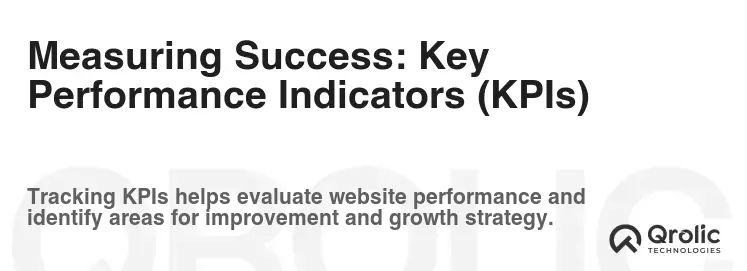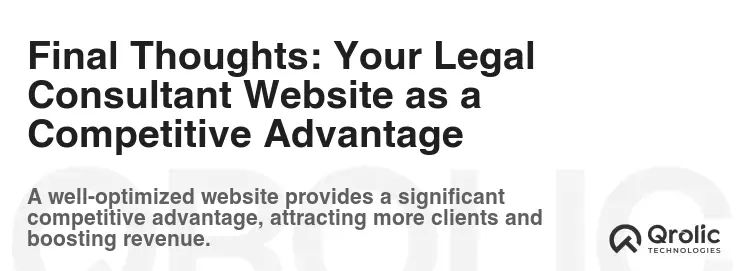Quick Summary:
- Build a professional, user-friendly legal website.
- Fill your site with valuable, SEO-friendly content.
- Regularly maintain and update your website.
- Track key metrics to ensure online success.
Table of Contents
- Why Your Law Firm Needs a Powerful Online Presence
- Missing Out on Clients
- Building Credibility and Trust
- Streamlining Client Communication
- Cost-Effectiveness and ROI
- Laying the Foundation: Domain Name, Hosting, and CMS Selection
- Choosing the Perfect Domain Name
- Selecting a Reliable Hosting Provider
- Choosing the Right Content Management System (CMS)
- Crafting a Compelling Design for Your Legal Consultant Website
- Key Elements of Effective Law Firm Website Design:
- Essential Pages for Your Legal Consultant Website:
- Website Design Considerations for Specific Practice Areas
- Content is King: Creating Engaging and Informative Content
- Types of Content That Attract Legal Clients:
- Writing for Your Target Audience:
- Optimizing Content for SEO:
- Search Engine Optimization (SEO): Making Your Law Firm Visible
- Keyword Research for Legal Services:
- On-Page SEO Optimization:
- Off-Page SEO Optimization:
- Local SEO for Law Firms:
- Monitoring Your SEO Performance:
- Accessibility: Ensuring Your Website is Inclusive
- Key Accessibility Considerations:
- Testing Your Website for Accessibility:
- Maintaining and Updating Your Legal Consultant Website
- Regular Maintenance Tasks:
- Adapting to Algorithm Updates:
- Content Refreshment Strategies:
- The Importance of Qrolic Technologies
- How Qrolic Technologies Can Help:
- Measuring Success: Key Performance Indicators (KPIs)
- Essential KPIs to Track:
- Tools for Tracking KPIs:
- Final Thoughts: Your Legal Consultant Website as a Competitive Advantage
Why Your Law Firm Needs a Powerful Online Presence

In today’s digital age, a strong online presence isn’t optional for legal consultants; it’s essential. Think of your website as your 24/7 virtual storefront. It’s where potential clients form their first impression, learn about your expertise, and ultimately decide whether to trust you with their legal matters. Without a compelling website, you’re essentially invisible to a vast pool of potential clients actively searching for legal help online.
Missing Out on Clients
Imagine someone facing a difficult legal situation. Where do they turn? Often, the internet is the first place they go. If your law firm isn’t easily found on search engines like Google, you’re missing out on countless opportunities. A well-optimized website acts as a magnet, attracting clients actively seeking your specific legal services.
Building Credibility and Trust
Your website is more than just a digital brochure. It’s a powerful tool for building credibility and trust. By showcasing your expertise through informative content, client testimonials, and case studies, you demonstrate your competence and establish yourself as a trusted authority in your field.
Streamlining Client Communication
A well-designed website can streamline communication with potential and existing clients. Features like contact forms, online appointment scheduling, and FAQs can save you time and improve client satisfaction. Providing easy access to information and support online allows you to focus on providing exceptional legal services.
Cost-Effectiveness and ROI
Compared to traditional marketing methods, a website offers a cost-effective way to reach a wider audience and generate leads. By investing in a professional website, you’re creating a valuable asset that can deliver a significant return on investment (ROI) over time.
Laying the Foundation: Domain Name, Hosting, and CMS Selection

Before diving into the design and content, you need a solid foundation for your legal consultant website. This involves choosing the right domain name, selecting a reliable hosting provider, and picking a content management system (CMS) that suits your needs.
Choosing the Perfect Domain Name
Your domain name is your online identity. It’s the address people will use to find you on the internet. Here’s how to pick a memorable and effective domain:
- Keep it short and simple: Avoid long, complicated names that are difficult to spell or remember.
- Reflect your brand: Include your law firm’s name or a keyword related to your area of expertise (e.g., [YourFirmName]Law.com, [City]DivorceLawyer.com).
- Use relevant keywords: Incorporating relevant keywords can improve your search engine ranking.
- Choose the right extension: Stick with common extensions like .com, .net, or .org. Consider .law for a more professional and niche-specific option, if available.
- Check availability: Use a domain name registrar (e.g., GoDaddy, Namecheap) to check if your desired domain name is available.
Selecting a Reliable Hosting Provider
Your hosting provider is where your website files are stored. Choose a provider that offers:
- Reliability and uptime: Look for a provider with a guaranteed uptime of at least 99.9%.
- Fast loading speeds: A slow-loading website can frustrate visitors and hurt your search engine ranking.
- Scalability: Choose a provider that can accommodate your website’s growth as your business expands.
- Security: Ensure the provider offers robust security features to protect your website from hacking and malware.
- Excellent customer support: Choose a provider with responsive and helpful customer support in case you encounter any issues.
- Specific Consideration For Lawyers: Seek providers with HIPAA compliance options if dealing with sensitive client data online.
Popular hosting providers include:
- Bluehost: A popular and affordable option, especially for beginners.
- SiteGround: Known for its excellent customer support and fast loading speeds.
- WP Engine: A managed wordpress hosting provider that’s optimized for performance and security.
Choosing the Right Content Management System (CMS)
A CMS allows you to easily manage your website’s content without needing to know how to code. Here are some popular options for legal consultant websites:
- WordPress: The most popular CMS in the world, WordPress is highly customizable and offers a vast library of themes and plugins. Its flexibility makes it a good choice for law firms of all sizes.
- Pros: Huge community support, vast plugin library, SEO-friendly.
- Cons: Can require technical knowledge for advanced customization.
- Squarespace: A user-friendly option that’s ideal for those who want a simple and visually appealing website.
- Pros: Easy to use, visually appealing templates, all-in-one platform.
- Cons: Less customizable than WordPress, fewer plugins available.
- Wix: Similar to Squarespace, Wix offers a drag-and-drop interface and a range of templates.
- Pros: Drag-and-drop interface, easy to use, affordable.
- Cons: Limited customization options, less SEO-friendly than WordPress.
- Joomla!: More complex than WordPress and other alternatives, this open-source CMS is a good option for larger law firms that need advanced features and security.
Why WordPress is Often the Best Choice for Legal Professionals:
While other CMS options exist, WordPress offers the optimal balance of features, customizability, and SEO capabilities crucial for attracting legal clients. Its open-source nature means ongoing development and a massive plugin ecosystem addressing nearly any specific need a law firm might encounter.
Crafting a Compelling Design for Your Legal Consultant Website

Your website’s design plays a crucial role in attracting and retaining visitors. A professional and user-friendly design can create a positive first impression and encourage potential clients to learn more about your services. Remember, the design should embody trust, professionalism, and accessibility.
Key Elements of Effective Law Firm Website Design:
- Professional and Clean Layout: Avoid cluttered designs and overwhelming amounts of information. Use white space effectively to create a clean and easy-to-navigate layout.
- High-Quality Images and Graphics: Use professional photos of your team and office. Avoid using stock photos that look generic.
- Clear Call-to-Actions (CTAs): Guide visitors towards desired actions, such as contacting you, scheduling a consultation, or downloading a resource. Use clear and concise CTAs that stand out from the rest of the content. Examples: “Schedule a Free Consultation,” “Contact Us Today,” “Download Our Guide.”
- Mobile Responsiveness: Ensure your website is fully responsive and looks great on all devices, including smartphones and tablets. Mobile-friendliness is crucial for SEO and user experience.
- Fast Loading Speeds: Optimize images and code to ensure your website loads quickly. A slow-loading website can frustrate visitors and hurt your search engine ranking.
- Easy Navigation: Make it easy for visitors to find the information they’re looking for. Use a clear and intuitive navigation menu.
- Brand Consistency: Maintain consistent branding throughout your website, including your logo, colors, and typography.
Essential Pages for Your Legal Consultant Website:
- Homepage: The first page visitors see. Use it to make a strong first impression and highlight your key services and value proposition. Include a compelling headline, a brief overview of your firm, and clear CTAs.
- About Us: Tell your story and introduce your team. Highlight your experience, qualifications, and values. This page is crucial for building trust and establishing credibility. Include photos and bios of each team member.
- Practice Areas: Clearly outline the legal services you offer. Provide detailed information about each practice area, including the types of cases you handle and the benefits of working with you.
- Attorney Profiles: Showcase each attorney’s individual expertise and accomplishments. Include their bio, photo, education, and experience. This page helps clients connect with the individual attorneys who will be handling their cases.
- Testimonials: Showcase positive feedback from past clients. Testimonials can significantly boost your credibility and encourage potential clients to choose your firm.
- Blog: Regularly publish informative and engaging blog posts on relevant legal topics. A blog can attract new visitors, establish your expertise, and improve your search engine ranking.
- Contact Us: Make it easy for visitors to get in touch with you. Include a contact form, phone number, email address, and physical address (if applicable).
- FAQ: Answer frequently asked questions about your services and the legal process. This can save you time and improve client satisfaction.
- Privacy Policy & Terms of Service: Essential for legal compliance and building trust.
Website Design Considerations for Specific Practice Areas
The design should also subtly reflect the type of law you practice. For example:
- Family Law: Warm, inviting colors and imagery to convey empathy and understanding.
- Corporate Law: Clean, modern design with a focus on professionalism and efficiency.
- Criminal Defense: Bold, confident design to convey strength and determination.
- Personal Injury: Design that emphasizes compassion and support for victims.
Content is King: Creating Engaging and Informative Content

High-quality content is the cornerstone of a successful legal consultant website. It’s what attracts visitors, establishes your expertise, and ultimately converts them into clients. Content should be informative, engaging, and optimized for search engines.
Types of Content That Attract Legal Clients:
- Blog Posts: Share your expertise on relevant legal topics. Provide valuable insights, answer common questions, and offer practical advice.
- Case Studies: Showcase successful outcomes you’ve achieved for your clients. Case studies provide concrete evidence of your competence and can be highly persuasive.
- White Papers and Guides: Offer in-depth information on complex legal topics. These resources can establish you as a thought leader in your field.
- Videos: Create engaging videos that explain legal concepts, introduce your team, or provide client testimonials.
- Infographics: Present complex information in a visually appealing and easy-to-understand format.
- Client Testimonials: Feature positive feedback from past clients. Testimonials are powerful social proof that can influence potential clients.
Writing for Your Target Audience:
- Understand your audience: Who are you trying to reach? What are their needs and concerns? Tailor your content to address their specific interests.
- Use clear and concise language: Avoid legal jargon and complex terminology. Write in a way that is easy for everyone to understand.
- Provide valuable information: Focus on providing helpful and informative content that addresses your audience’s needs.
- Use a conversational tone: Write in a way that is friendly and approachable.
- Break up your content: Use headings, subheadings, bullet points, and images to make your content easier to read.
- Proofread carefully: Ensure your content is free of errors in grammar and spelling.
Optimizing Content for SEO:
- Keyword Research: Identify the keywords that your target audience is using to search for legal services. Use these keywords throughout your website content.
- On-Page Optimization: Optimize your website’s title tags, meta descriptions, and header tags with relevant keywords.
- Internal Linking: Link to other relevant pages on your website.
- External Linking: Link to authoritative sources outside your website.
- Image Optimization: Optimize your images with descriptive alt tags.
Search Engine Optimization (SEO): Making Your Law Firm Visible

SEO is the process of optimizing your website to rank higher in search engine results pages (SERPs). A higher ranking means more visibility, more traffic, and ultimately, more clients.
Keyword Research for Legal Services:
- Identify relevant keywords: Brainstorm a list of keywords related to your practice areas and target audience. Use keyword research tools like Google Keyword Planner, Ahrefs, and SEMrush to find additional keywords.
- Consider long-tail keywords: These are longer, more specific phrases that people use when searching for legal services. Long-tail keywords can be less competitive and more likely to convert into clients. Examples: “DUI attorney near me,” “child custody lawyer in [City],” “how to file for bankruptcy in [State].”
- Analyze your competitors: See what keywords your competitors are targeting.
On-Page SEO Optimization:
- Title Tags: Optimize your title tags with relevant keywords. Each page should have a unique and descriptive title tag.
- Meta Descriptions: Write compelling meta descriptions that entice users to click on your website in the search results.
- Header Tags (H1-H6): Use header tags to structure your content and highlight important keywords.
- URL Structure: Use short, descriptive URLs that include relevant keywords.
- Image Alt Tags: Add descriptive alt tags to your images that include relevant keywords.
- Content Optimization: Use your target keywords throughout your website content, but avoid keyword stuffing.
Off-Page SEO Optimization:
- Link Building: Acquire backlinks from other authoritative websites. Backlinks are a signal to search engines that your website is trustworthy and valuable.
- Directory Listings: List your law firm in online directories like Yelp, Avvo, and FindLaw.
- Social Media Marketing: Promote your website and content on social media platforms.
- Online Reputation Management: Monitor your online reviews and respond to both positive and negative feedback.
Local SEO for Law Firms:
- Google My Business: Create and optimize your Google My Business listing. This is crucial for ranking in local search results.
- Local Citations: Ensure your law firm is listed in local directories with accurate contact information.
- Local Content: Create content that is relevant to your local community.
Monitoring Your SEO Performance:
- Google Analytics: Use Google Analytics to track your website traffic, bounce rate, and conversion rate.
- Google Search Console: Use Google Search Console to monitor your website’s search engine performance, including your keyword rankings and crawl errors.
- SEO Tools: Use SEO tools like Ahrefs and SEMrush to track your keyword rankings, analyze your competitors, and identify opportunities for improvement.
Accessibility: Ensuring Your Website is Inclusive

Website accessibility means designing and developing your website so that it is usable by people with disabilities. This includes people with visual, auditory, motor, or cognitive impairments. Not only is it the right thing to do, but it can also expand your reach and improve your website’s overall usability. Furthermore, in many jurisdictions, website accessibility is a legal requirement.
Key Accessibility Considerations:
- Alternative Text for Images: Provide descriptive alt text for all images. This allows screen readers to convey the image’s content to visually impaired users.
- Keyboard Navigation: Ensure that all website elements can be accessed and operated using a keyboard.
- Color Contrast: Use sufficient color contrast between text and background to make it easy to read.
- Clear and Simple Language: Use clear and concise language that is easy for everyone to understand.
- Captions and Transcripts for Videos: Provide captions and transcripts for all videos.
- Semantic HTML: Use semantic HTML tags to structure your content. This helps screen readers understand the content and navigate the page.
- Accessible Forms: Design forms that are easy to fill out for people with disabilities.
- Use ARIA attributes: Use ARIA attributes to provide additional information about website elements to assistive technologies.
Testing Your Website for Accessibility:
- Use accessibility testing tools: Use tools like WAVE and Accessibility Insights to identify accessibility issues.
- Test with screen readers: Test your website with screen readers like JAWS and NVDA.
- Manual testing: Manually review your website to identify any accessibility issues.
Maintaining and Updating Your Legal Consultant Website

Your website is not a “set it and forget it” project. It requires ongoing maintenance and updates to ensure it remains secure, functional, and relevant.
Regular Maintenance Tasks:
- Update your CMS and plugins: Regularly update your CMS and plugins to patch security vulnerabilities and improve performance.
- Backup your website: Regularly back up your website to protect your data in case of a security breach or other disaster.
- Monitor your website for errors: Use Google Search Console to monitor your website for crawl errors and other issues.
- Check for broken links: Use a broken link checker to identify and fix any broken links on your website.
- Update your content: Keep your website content fresh and up-to-date.
- Monitor your website’s performance: Use Google Analytics to track your website traffic, bounce rate, and conversion rate.
Adapting to Algorithm Updates:
Search engine algorithms are constantly evolving. Stay informed about the latest algorithm updates and adjust your SEO strategy accordingly.
Content Refreshment Strategies:
- Update old blog posts: Review your old blog posts and update them with new information.
- Add new content: Regularly add new content to your website to keep it fresh and engaging.
- Repurpose your content: Repurpose your content into different formats, such as videos, infographics, and podcasts.
The Importance of Qrolic Technologies

Qrolic Technologies (https://qrolic.com/) stands as a valuable partner for law firms seeking to establish or enhance their online presence. With expertise in website design, development, and SEO, Qrolic Technologies can help legal consultants create a website that not only looks professional but also drives results.
How Qrolic Technologies Can Help:
- Custom Website Design: Qrolic Technologies can create a custom website design that reflects your law firm’s brand and values.
- SEO Optimization: Qrolic Technologies can optimize your website for search engines, helping you rank higher in search results and attract more clients.
- Content Creation: Qrolic Technologies can help you create engaging and informative content that attracts and converts visitors.
- Website Maintenance: Qrolic Technologies can provide ongoing website maintenance and support to ensure your website remains secure and functional.
- E-commerce Integration: If you sell online training courses or guides, Qrolic can seamlessly integrate e-commerce functionality.
- HIPAA Compliance: They can build websites that meet the stringent security and compliance requirements for handling protected health information.
- ADA Compliance: They ensure sites meet ADA standards, enabling law firms to cater to a broader audience including those with disabilities.
- Lead Generation Tools: Integration of advanced tools for capturing and nurturing potential leads, enhancing client acquisition.
By partnering with Qrolic Technologies, law firms can focus on providing exceptional legal services while leaving the complexities of website design and SEO to the experts.
Measuring Success: Key Performance Indicators (KPIs)

It’s crucial to track the performance of your legal consultant website to ensure it’s meeting your goals. By monitoring key performance indicators (KPIs), you can identify what’s working, what’s not, and make data-driven decisions to improve your website’s effectiveness.
Essential KPIs to Track:
- Website Traffic: Track the number of visitors to your website over time. Use Google Analytics to monitor your website traffic sources, including organic search, direct traffic, referral traffic, and social media traffic.
- Bounce Rate: The percentage of visitors who leave your website after viewing only one page. A high bounce rate may indicate that your website is not engaging or relevant to your target audience.
- Time on Page: The average amount of time visitors spend on each page of your website. A longer time on page may indicate that your content is engaging and informative.
- Conversion Rate: The percentage of visitors who complete a desired action, such as contacting you, scheduling a consultation, or downloading a resource.
- Lead Generation: Track the number of leads generated through your website. Use a contact form or lead tracking software to monitor your lead generation efforts.
- Keyword Rankings: Track your website’s keyword rankings in search engine results pages (SERPs).
- Backlinks: Track the number of backlinks to your website. Use a backlink checker to monitor your backlink profile.
- Domain Authority: A metric that measures the overall authority of your website.
- Cost Per Lead (CPL): Helps determine the efficiency of marketing spends by calculating the cost to acquire each lead.
- Return on Investment (ROI): Gauges the profitability of website initiatives by comparing the revenue generated to the investment made.
Tools for Tracking KPIs:
- Google Analytics: A free tool that provides detailed insights into your website traffic and user behavior.
- Google Search Console: A free tool that helps you monitor your website’s search engine performance.
- SEO Tools: Tools like Ahrefs and SEMrush can help you track your keyword rankings, analyze your competitors, and identify opportunities for improvement.
- CRM Software: Customer Relationship Management (CRM) software can help you track leads, manage client interactions, and measure the effectiveness of your marketing efforts.
Final Thoughts: Your Legal Consultant Website as a Competitive Advantage

Creating a successful legal consultant website is an ongoing process. By following the steps outlined in this guide and continuously monitoring your website’s performance, you can create a powerful online presence that attracts clients, establishes your expertise, and helps you grow your law firm. In the competitive legal landscape, a well-designed and optimized website is not just an asset; it’s a competitive advantage. Embrace the digital realm, leverage the power of online marketing, and watch your legal practice thrive.









